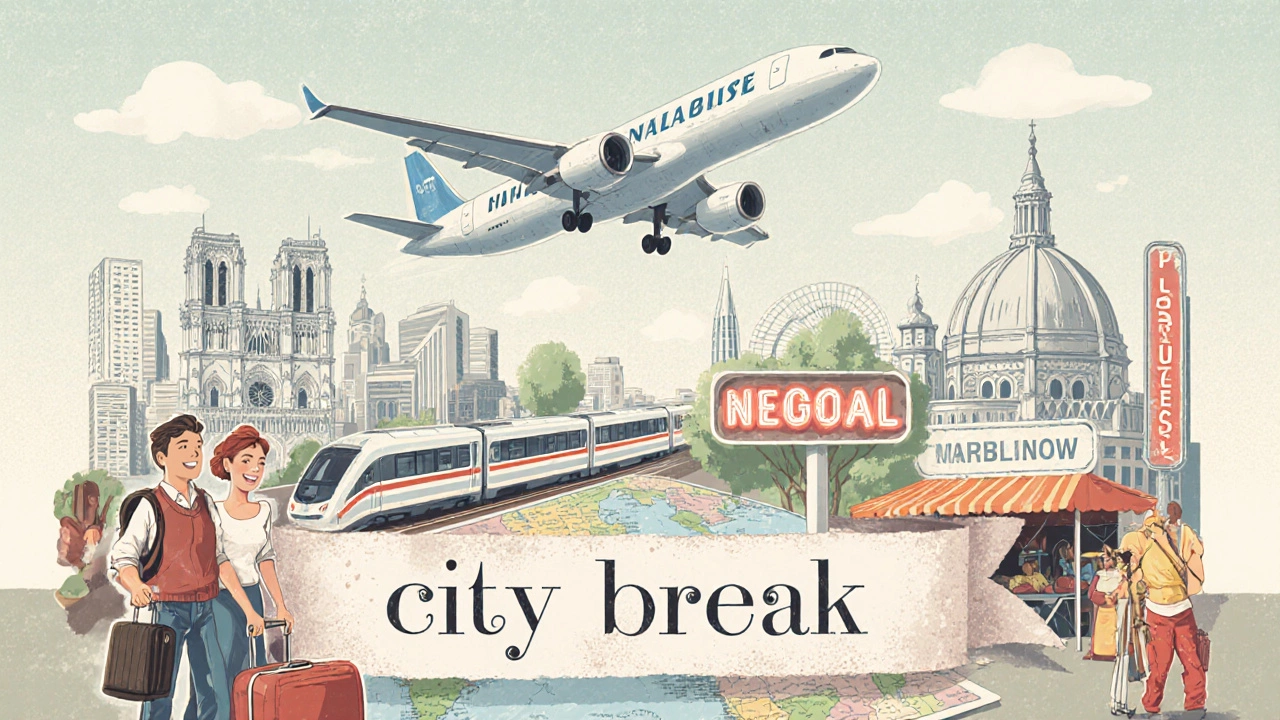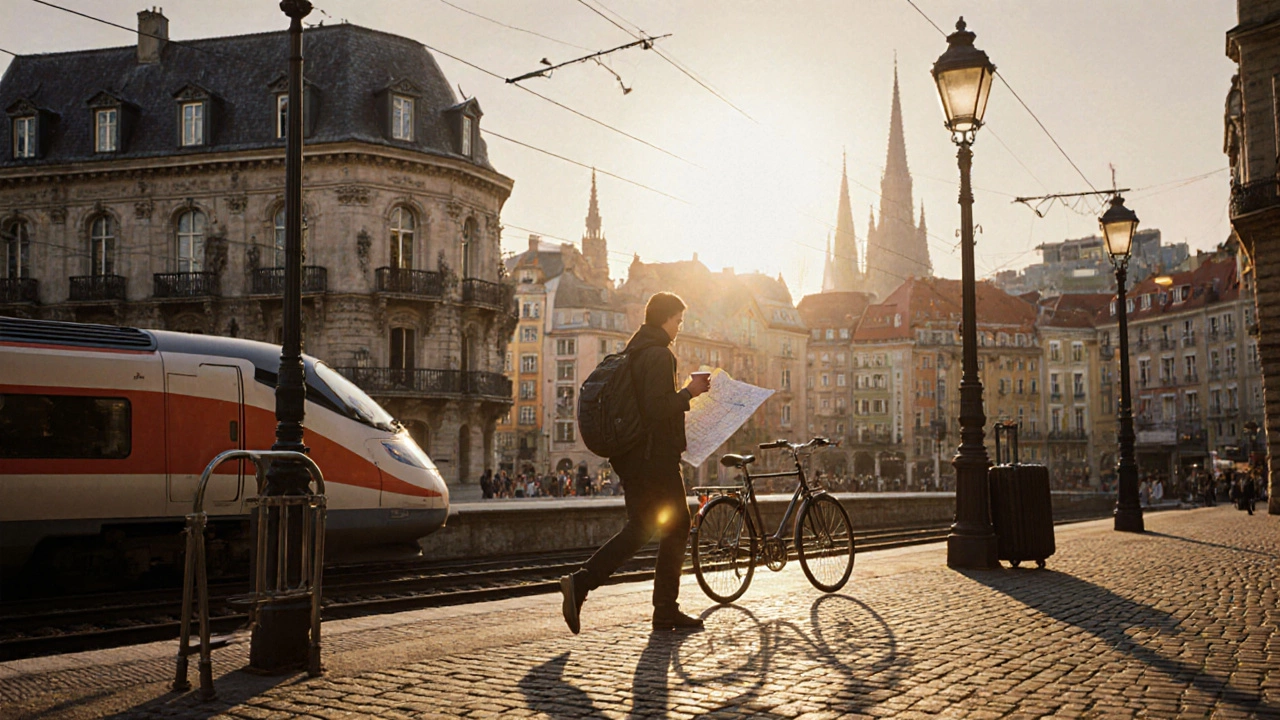City Break Cost Calculator
Your Budget Estimate
Breakdown
Tips for Saving Money
- ✓ Book flights mid-week for best prices
- ✓ Use city transport passes instead of individual tickets
- ✓ Try local street food instead of tourist restaurants
- ✓ Consider shorter stays (2-3 nights) for maximum value
The term city break pops up in travel blogs, but what does it actually mean?
What a City Break Really Is
In travel jargon, city break refers to a short, usually weekend‑long, urban vacation designed for quick immersion in culture, food and sights. The idea is simple: you trade a few days of work for a burst of city life, often flying or taking a high‑speed train to a destination you can explore in 48‑72 hours.
How the Phrase Came to Be
The expression emerged in the late 20th century as airlines and rail operators began marketing cheap, short‑haul flights specifically for weekend travelers. Early brochures used the phrase “city break” to differentiate these trips from long beach holidays or mountain retreats. By the 1990s, tourism boards in Europe and Asia had adopted the term in official statistics, solidifying its place in the travel lexicon.
Key Features That Define a City Break
- Duration: Typically 2-4 nights, fitting neatly into a long weekend.
- Destination: A single urban centre where hotels, attractions and transport are within walking distance.
- Focus: Culture, gastronomy, architecture, nightlife, and shopping rather than sun‑bathing.
- Transport: Fast connections-budget airlines, high‑speed rail, or short‑haul buses-keep travel time low.
Related Concepts: Staycation, Weekend Getaway, and More
When you hear people talk about a quick escape, they might be using a related term.
For example, a staycation is a vacation taken at home or nearby, where you enjoy local attractions instead of traveling far. The staycation gained popularity during economic downturns when people wanted a break without the cost of transport.
A weekend getaway refers to any short trip-whether to a city, a countryside cottage, or a spa resort-planned for a Saturday‑Sunday window. While a weekend getaway can be rural, a city break specifically emphasizes the urban environment.
Another close cousin is urban tourism the practice of visiting city centres to experience their cultural and social offerings. Urban tourism is the broader industry; city break is the specific product within it.

Why Travelers Prefer City Breaks
Several practical reasons make city breaks a go‑to option for busy professionals and students alike:
- Time efficiency: You can reset your routine without taking a week off.
- Cost‑effectiveness: Budget airlines and discount rail tickets keep transport cheap.
- Variety: One city can offer museums, street food, night markets, and historic sites-all in a compact area.
- Ease of planning: Travel agencies and online platforms often bundle flights, hotels and city passes into a single package.
Comparing City Breaks, Staycations, and Road Trips
| Aspect | City Break | Staycation | Road Trip |
|---|---|---|---|
| Typical Length | 2‑4 nights | 1‑3 nights | 3‑7 days |
| Primary Goal | Urban cultural immersion | Relaxation at home | Scenic travel & exploration |
| Transport Mode | Plane, train, bus | Car (optional) | Car, sometimes bike |
| Cost Drivers | Flights & city accommodation | Local activities & dining | Fuel, accommodation, tolls |
| Typical Audience | Professionals, students, couples | Families, retirees | Adventure seekers |
How to Plan a Perfect City Break
Even a short trip benefits from a bit of structure. Follow these steps to make the most of your urban getaway:
- Pick a destination: Choose a city with good transport links and a compact centre. Examples include Barcelona, Prague, Kyoto, or Cape Town.
- Lock in travel dates: Look for mid‑week flights that land Friday night and return Sunday evening to maximise sightseeing time.
- Book accommodation wisely: Stay within walking distance of key attractions. Boutique hotels or well‑located Airbnbs often include breakfast, saving you time.
- Map a “must‑see” list: Identify 3‑4 highlights-like a museum, a market, a viewpoint and a local restaurant.
- Buy a city pass: Many cities offer transport and attraction bundles that pay for themselves after a couple of visits.
- Leave room for spontaneity: Reserve an evening for a street‑food crawl or a live music venue you discover on the fly.
Common Pitfalls and How to Avoid Them
- Over‑packing the itinerary: Trying to cram too many sites into two days leads to fatigue. Stick to a realistic core and let the city surprise you.
- Ignoring local transport zones: Many European metros have zone‑based tickets. Buying the wrong fare can cost you extra money.
- Missing out on local food: Tourist traps are often pricey and underwhelming. Use apps or ask locals for authentic eateries.
- Forgetting to check entry requirements: Even short trips may need visas or a COVID‑related health pass. Verify before you book.
Future Trends in City Breaks
As remote work becomes permanent for many, the line between work and leisure continues to blur. Companies are now offering “work‑cation” packages that let employees combine a short business trip with a cultural city break. Additionally, sustainable tourism certifications are popping up, encouraging travelers to pick cities that prioritize green transport and low‑impact accommodations.
Frequently Asked Questions
Is a city break the same as a weekend getaway?
A city break is a type of weekend getaway that specifically focuses on an urban destination, whereas a weekend getaway could be rural, coastal, or spa‑oriented.
What is the ideal length for a city break?
Two to four nights works best. It gives enough time to see the main sights without feeling rushed.
Can I take a city break on a budget?
Yes. Look for low‑cost airlines, use public transport passes, stay in hostels or budget hotels, and eat at local street vendors.
Do city breaks require a passport?
If you cross an international border, a passport is mandatory. For intra‑country trips, a national ID often suffices.
How do city breaks differ from staycations?
A staycation stays within your home region, while a city break involves traveling to another city to experience its culture and attractions.
What are some popular city break destinations in 2025?
Lisbon, Bangkok, Medellín, Melbourne, and Cape Town are topping the 2025 lists thanks to improved transport links and vibrant downtown scenes.






